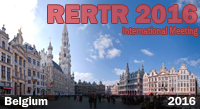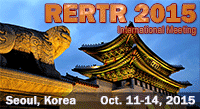Abstracts and Available Papers Presented at the
2004 International RERTR Meeting
An Indian Perspective for Transportation and Storage of Spent Fuel
P.K. Dey
Fuel Reprocessing Division
Bhabha Atomic Research Centre
Trombay Mumbai-400 085, India
ABSTRACT
The spent fuel discharged from the reactors are temporarily stored at the reactor pool. After a certain cooling time, the spent fuel is moved to the storage locations either on or off reactor site depending on the spent fuel management strategy. As India has opted for a closed fuel cycle for its nuclear energy development, reprocessing of the spent fuel, recycling of the reprocessed plutonium and uranium and disposal of the wastes from the reprocessing operations forms the spent fuel management strategy. Since the reprocessing operations are planned to match the nuclear energy programme, storage of the spent fuel in ponds are adopted prior to reprocessing. Transport of the spent fuel to the storage locations are carried out adhering to international and national guide lines. India is having 14 operating power reactors and three research reactors. The spent fuel from the two safeguarded BWRs are stored at-reactor (AR) storage pond. A separate wet storage facility away-from-reactor (AFR) has been designed, constructed and made operational since 1991 for additional fuel storage. Storage facilities are provided in ARs at other reactor locations to cater to 10 reactor-years of operation. A much lower capacity spent fuel storage is provided in reprocessing plants on the same lines of AR fuel storage design. Since the reprocessing operations are carried out on a need basis, to cater to the increased storage needs two new spent fuel storage facilities (SFSF) are being designed and constructed near the existing nuclear plant sites. India has mastered the technology for design, construction and operation of wet spent fuel storage facility meeting all the international standards Wet storage of the spent fuel is the most commonly adopted mode all over the world. Recently an alternate mode viz. dry storage has also been considered. India has designed, constructed and operated lead shielded dry storage casks and is operational at one site. A dry storage cask made of concrete with stainless steel cavity was also designed for spent PHWR fuel. Fuel transportation is subjected to highly explicit safety and security regulations, constantly updated by international and national experts. It is noted that the radioactive material transportation regulations comprise two distinct objectives. Security or physical protection, consisting in the preventive losses, disappearances, thefts or misappropriation of nuclear materials. Safety, which consists in controlling the irradiation, contamination and criticality hazards inherent in the transportation of radioactive materials, with a view to ensuring that man and the environment remain unaffected by the potential pollution involved. Certain principles underline the transport regulations setup by IAEA and the universally adopted rule is that transport safety must be based on three lines of defense. Viz. the concept of a package, the reliability of transport and the efficacy of specific resources to deal with an accident. Spent fuel transport is carried out in "type B" packages, designed to withstand severe accident conditions, simulated by tests, validated by approval certificates and subject to inspection.
![]() PDF version available
PDF version available
DOWNLOAD full paper in PDF format.
Contact:
Dr. Jordi Roglans-Ribas
Technical Director, RERTR Department
Nuclear Engineering Division – 362
Argonne National Laboratory
9700 South Cass Avenue
Argonne, IL 60439
Fax: +1 630-252-5161
![]()




